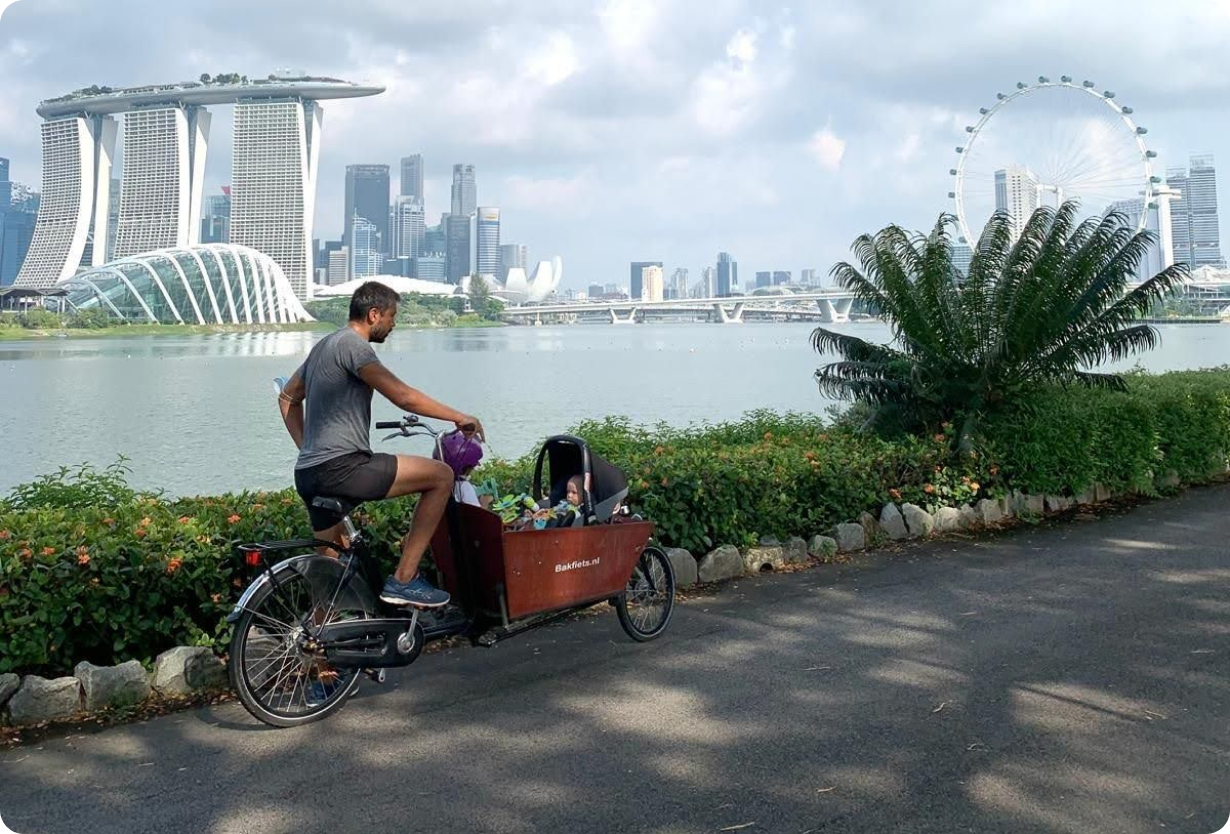
Last updated: 16th May, 2025
I was born in a small village in India and spent most of my life in the bustling metropolis of Los Angeles. My wife was born in a small village in the Netherlands and grew up in Amsterdam. We both eventually found our way to Singapore, where our children were born and are now growing up.
From day one, we’ve wanted to live internationally — experiencing as much of this beautiful planet as possible. It wasn’t a decision we deliberated over for years; it was simply who we are. And now, we’re raising our children with this same global mindset.
This journey isn’t unique to us. By mid-2024, the global expatriate population had swelled to over 300 million — more than triple the number in 1970.¹ About 24% of American remote workers now travel internationally with their children.² Together, these trends mean more “third culture kids” (TCKs) and cross-border families than ever before.
For families considering this path, or those already on it, I’d like to share what we’ve learned about raising children across cultures, languages, and borders.

Thinking of relocating?
A free call with our relocation expert will give you a clear path forward – no stress, just answers.
The Language Journey: Multiple Languages from Day One
At home, English is our primary language, though my wife speaks Dutch and Frisian with her family. Our kids are learning both Dutch and Chinese alongside English — part of their daily life in multicultural Singapore. This approach to multiple languages stems from our environment rather than a deliberate strategy. Singapore’s multicultural society makes exposure to multiple languages natural, not forced.
Research shows that children between birth and about age 8 are in a “critical period” for language acquisition.³ During this time, the brain is remarkably adaptable, and children can learn second or third languages as naturally as their first.
Multilingualism brings significant cognitive benefits. Bilingual children often develop enhanced cognitive flexibility and an improved ability to switch attention and handle complex tasks. It’s like mental exercise that strengthens the brain’s executive function.³ Studies show bilingual children frequently outperform monolingual peers on problem-solving puzzles that require sorting by multiple rules.⁴
Of course, challenges exist. Some children may mix languages or start speaking slightly later. But pediatricians and linguists encourage expatriate parents to speak their native language at home without fear of “confusing” children.³ Kids naturally learn to separate languages by context and speaker.
For us, watching our children effortlessly switch between languages depending on who they’re talking to has been remarkable. They don’t see it as unusual or difficult — it’s simply part of how they communicate.
Identity Formation: Children of the World
We chose Singapore because of the quality of its education system, the diversity of its people, and the exceptional healthcare. It’s a place where our children are exposed to friends from every corner of the world — something that feels natural to them, not exceptional.
Children who grow up globally often become “third culture kids” — those who spend significant developmental years outside their parents’ passport culture.⁵ This upbringing creates both unique advantages and specific challenges.
On the positive side, TCKs typically develop exceptional open-mindedness and cross-cultural competency. They learn to navigate different customs, languages, and social norms from an early age.⁵ Studies show that TCKs tend to be more tolerant of diverse cultures and more adaptable to new environments than peers who grew up in one place.
However, identity formation can be more complex for TCKs. Because they spend formative years moving between worlds, they often report feeling they don’t fully belong in any single culture.⁵ They may hold passports from one country yet have little day-to-day connection to it.
It’s a question our children haven’t faced yet, but I imagine they’ll someday be asked: “Where are you from?” The answer won’t be simple. Were they born in Singapore? Yes. Are they Indian because of me? Partly. Are they Dutch because of their mother? Also partly. This complexity of identity will be theirs to navigate.
We’ve decided to see this not as a disadvantage but as a strength. Our children are developing an identity based on values, experiences, and relationships rather than a single geography. They’re creating something new — a global identity that transcends borders.
Educational Choices in a Global Context
Education represents one of our most significant considerations. We chose Singapore partly for its exceptional education system, with options ranging from local schools to international institutions following various curricula.
As of July 2024, there were 14,457 K-12 international schools globally, enrolling approximately 7.3 million students.⁶ These schools are concentrated in regions with large expat communities. Asia alone hosts 57% of all international schools, with countries like China, India, and the UAE leading in numbers.⁷
International schools often provide continuity for globally mobile families. A child can transition from an American international school in Thailand to one in Singapore with minimal disruption. They also tend to have diverse student bodies and support systems for non-native speakers.
The quality varies significantly, of course. In major hubs like Singapore, Dubai, or Hong Kong, there are numerous options — though competition for spots can be intense and tuition costly. In smaller cities, choices may be limited, forcing families to consider local schools or homeschooling.
Timing transitions with academic calendars will most likely help children adjust. A study from Loyola University Chicago found that even a single school move doubles the risk of not graduating from high school, and two or more moves quadruple that risk.8 Furthermore, students experiencing mid-year transitions face significantly higher challenges — research shows they have double the risk of not graduating compared to those with stable educational experiences.9
The Bureaucratic Reality
Of course, moving across borders comes with paperwork: birth certificates, school records, healthcare documentation. But it’s just part of the game when you live globally. Every move triggers a cascade of administrative tasks. Each country has its requirements, timelines, and procedures.
The key is organization. We maintain comprehensive records — both digital and physical copies of essential documents. Birth certificates, immunization records, school transcripts, passport copies — everything organized and accessible.
Some practical lessons we’ve learned:
- Research documentation requirements before moving, not after arriving
- Have documents apostilled or notarized in the country of origin where possible
- Keep medical records in standardized formats
- Maintain vaccination records that meet international standards
Healthcare Considerations
Healthcare quality varies dramatically worldwide — a critical factor when choosing where to raise children. Singapore’s healthcare system was a significant factor in our decision to remain here.
For global families, healthcare involves several considerations:
- Access to quality pediatric care
- Continuity of medical records
- Understanding insurance coverage across borders
- Managing prescriptions when moving between countries
According to a 2024 InterNations survey, South Korea ranked highest for expat healthcare satisfaction, followed by Qatar, Spain, Japan, and Luxembourg.¹⁰ Interestingly, the United States ranked poorly due to cost and complexity.
We’ve learned to prioritize healthcare infrastructure when considering relocations. Having quality healthcare accessible gives us peace of mind, especially with children who are still developing and may face unexpected health challenges.
The Real Challenges
The biggest challenge? Being confident that we are providing the best possible environment for them, knowing that childhood conditioning shapes worldviews forever.
This uncertainty isn’t just about big decisions — it’s about daily choices. Are we spending too much time focused on logistics rather than childhood experiences? Are our children missing out on deep, long-term friendships? Will they struggle with identity issues we can’t foresee?
Research shows that most expat children need more than six months to feel fully settled after an international move.¹¹ The #1 challenge reported is missing friends and extended family from back home.¹¹ About 1 in 4 children take over a year to fully adjust.
For parents, the adjustment period is often longer. We’re dealing with our own cultural adaptation while trying to support our children through theirs. It requires patience, understanding, and sometimes accepting that things won’t feel “normal” for a while.
The Unexpected Rewards
Watching them move through the world with an ease and adaptability is the reward for overcoming the challenges. Those innate skills will become a superpower in an increasingly globalized future.
Our children don’t see diversity as unusual — it’s their normal. They interact naturally with people from different cultures, speak multiple languages without thinking about it, and adapt to new situations with remarkable flexibility.
These benefits extend beyond cultural competency. Research suggests that TCKs often develop:⁵
- Enhanced problem-solving abilities
- Greater empathy and emotional intelligence
- Improved communication skills
- Strong adaptability and resilience
- A global perspective on local issues
Studies indicate that TCKs are four times more likely to earn bachelor’s degrees compared to their peers (81% vs. 21%), and commonly pursue careers in international fields that leverage their global skills.⁶
Building the Future
This experience — raising children who move through the world with natural adaptability — drives everything we’re building at Zerra. We’re creating a platform for families like ours, people who see borders as lines on maps rather than barriers to life.
The future belongs to those who can move, adapt, and thrive anywhere. Our children are already living that future. They’re developing skills and perspectives that will serve them in a world where global citizenship isn’t just an ideal — it’s a practical reality.
At Zerra, we’re building the infrastructure that supports this lifestyle and creating tools that make global family life not just possible, but smooth.
Final Thoughts
My advice to families considering raising kids internationally: Do it. It seems daunting at first, but it’s worth every bit of the effort.
Yes, there are challenges. The bureaucracy can be frustrating. The uncertainty can be overwhelming. There will be moments when you question whether you’re making the right choices.
But the rewards — watching your children develop into truly global citizens, seeing them navigate cultures with ease, observing their natural adaptability — make every challenge worthwhile.
As 300 million people now live outside their birth countries, with families representing a growing portion of this population, we’re part of a movement that’s reshaping what it means to belong somewhere.
Our children won’t be restricted by the accident of birth. They’ll belong to the world, and the world will belong to them.

Ready to explore your global mobility options?
A free call with our relocation expert will give you a clear path forward — no stress, just answers.
- SavvyNomad. (2025). Expat Statistics in 2025 — Global expat population growth and demographics.
- Localyze. (2024). Digital nomad demographics (24% of American nomads travel with kids).
- Michigan State University Extension. Early childhood bilingualism and cognitive benefits.
- Bialystok & Martin-Rhee study via MSU. Bilingual kids’ problem-solving advantage.
- Psychology Today. (March 2022). TCK characteristics, identity struggles.
- ISC Research. (2024, July 31). July 2024 International School Market Insights.
- Education Week. (October 2024). Top countries for international schools, 7M students globally. ICEF Monitor. (February 2024). International schools market data (number of schools, distribution).
- Grais, B. M. (2011). High School Transfer Student Transitions and Changes: Risk, Success, Failure, and the Vital Role of the Counseling Curriculum (Doctoral dissertation, Loyola University Chicago)
- Ohio Education Research Center. (n.d.). Student Mobility and High School Graduation.
- AXA/InterNations Expat Insider 2024. Expat healthcare rankings (South Korea #1).
- HSBC Expat Explorer (c.2017). Expat family survey (adjustment time, challenges, costs, benefits).





